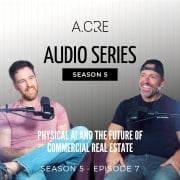A Look at Commercial Real Estate Lease Audits with Michael Hetchkop | S3SP23
In this episode of the A.CRE Audio series, Spencer, Michael, and Sam talk with Michael Hetchkop about the nuanced world of commercial real estate lease audits. Michael Hetchkop, a seasoned professional in the field, shares his expertise on lease audits, the complexities of lease terms and expenses, and common issues that can arise when leases are not thoroughly examined.
Whether you’re a tenant looking to ensure you’re not overpaying, a property owner seeking transparency in your financial transactions, or anyone tasked with commercial real estate analysis, watch, listen, or read this episode to learn about this essential skill.
A Look at Commercial Real Estate Lease Audits with Michael Hetchkop
Or Listen to this Episode
Resources from this Episode
Episode Transcript
Sam Carlson (00:00):
Hello and welcome back to another podcast episode. Today, it’s the word that strikes fear into every entrepreneur, and that is the word audit. But it’s a little bit different because today we’re talking about commercial real estate lease audits, a topic that’s new to many. And to kick this off, I’m going to turn it over to Spencer.
Spencer Burton (00:17):
Yeah. So thanks Sam. We have here guest Michael Hetchkop. Michael is a Principal at Cresa, and he is a lease forensics and enforcement professional. And to Sam’s point, that sounds scary. But as we talk through it with Michael and understanding what he does on a day-to-day basis, I actually find it incredibly valuable, both to the tenant. So if you’re representing a tenant or say you’re a leasing agent, what Michael does is incredibly valuable. I also think there’s an opportunity for what Michael does to help real estate owners or in particular real estate investors. So Michael, great to have you. Maybe to start, why don’t you give just the audience a bit of background about you and how you got into this niche of commercial real estate?
Michael Hetchkop (01:09):
Great, thank you for inviting me. This is very exciting and I’m looking forward to talking about my very exciting topic. I will just tell you right off the bat, the reason that I call it least forensics and enforcement, is because I thought that sounded a lot better than audit, which is the word you mentioned earlier. And in fact, audit is not really what happens in this realm, but I’ll explain more about that later.
(01:33):
I started doing this over 30 years ago, been on the tenant side. As you know, Cresa is a commercial real estate company represents occupiers. So we thought it was a good idea that after negotiating leases for 6, 8, 9 months, that we make sure they’re being administered properly. My background is I’m a CPA, I’m an MBA. I’m also a professor at Georgetown University and the Master’s of real Estate program, surprisingly teaching a class on leases. So I talk to students about this all the time.
Spencer Burton (02:12):
So help the audience understand what a lease audit is from the context of both the you referred to as an occupier we think of as our tenant and the owner. Describe the process, if you will, for the audience.
Michael Hetchkop (02:29):
A lease audit is really a thorough examination of the lease after it’s been done, and any other financial associated financial transactions that happen after that. Typically, a tenant receives one of these reconciliation bills for the previous year, either three months, six months, nine months after the lease has been in effect. These bills are very cryptic, so it’s very hard to understand. And what most tenants do is they look at the bill, they see the math works and they pay it. And in some cases that’s really not the right thing to do because you really need to do more due diligence on it.
(03:17):
So my team goes back to the landlord and says, “How did you calculate this? What are the line items that you’re including to come up with this bill?” And a lot of times when I talk to the property manager and ask them about this and tell them what I need, they say, “Well, this is surprising. No other tenant has asked.” I like that in a way, but I don’t think that’s good.
(03:47):
So we all know that leases are long documents, they’re very subjective. What we do is in our process, and I think this is where we set ourselves a little bit apart, is we concentrate on the lease first. It’s easy to go to the numbers and say, this increased 8%, 10%, whatever it is. But you really need to understand what the lease says and before you go into the numbers. So I spend hours, I may read a lease two, three times. I read well over probably 100 to 150 a year. And that’s one of the reasons why a lot of people don’t like to do what I do, just to put that in there.
(04:30):
Anyway, so we go through that process. We do trend analysis, and really it’s not really rocket science. It’s really taking the couple of years operating expenses and trending them and seeing where they’ve gone. We’ve had challenges of course with the pandemic for sure. 2020 a lot of operating expenses were less because of less occupancy. Now we’re seeing some of them increase over time. So we want to make sure that the ones that are increasing make sense to us. We want to make sure that the landlord is doing the things that the lease says they should be doing.
(05:11):
And unfortunately in the history of me doing this is that we have found lots of mistakes. And a lot of mistakes happen as you can imagine. Think of the environment we’re dealing in right now. Buildings are potentially going back or buildings are getting sold at massive discounts. So the property management company changes the philosophy of how they do the pass through changes, the accounting system changes. So we have to go through all of that, make sure as an accountant, I’m looking for things to be done correctly and consistently over time. Well, that’s a lot of the process and it takes us literally a very long time because we’re going back to property managers and accountants to get the backup data. Sometimes it may be an invoice or a general ledger. But most of the time we’re able to, and with my experience, we’re able to tell where are the items that we think are potential errors right off the bat.
Michael Belasco (06:19):
So Michael, for those in our audience that may not know, why don’t you give a little walkthrough of what the typical pass through provisions are in all lease? What expenses are you typically seeing that tenants are paying?
Michael Hetchkop (06:32):
Okay.
Michael Belasco (06:33):
Or obligated to pay?
Michael Hetchkop (06:34):
Okay. Now, so in a lease, and if I get two granular stop me. But in a lease, and you’ve done a number of them. You know that a lease says, what’s the rent? And that’s pretty self-explanatory. There’s usually a base red chart and we go from there and I recalculate it anyway. Then we go to this additional rent paragraph. And the additional rent paragraph says, this is what the landlord is allowed to charge. Things like salaries, utilities, security, real estate. But then we go to the next paragraph that says the landlord is not allowed to charge the following. And these are things like depreciation of the building.
(07:29):
One of the biggest gray areas that we’re constantly working on are capital expenses. Now, in a typical lease, an inclusion for capital expenses is allowed if it reduces the operating expenses of the building or required by government regulations. Now the exclusions will say capital expenses are to be excluded except for those that I just discussed. So we typically find a lot of capital items that we debate are not those that should be on the tenant side of the ledger. So that’s one big one that happens, and we wind up… And then even if it should be on the tenant side of the ledger, we come to that conclusion, we want it to be amortized over a period of time. They shouldn’t be charging it all in one year. I have lists of anywhere from 28 to 62 exclusions. I mean, we don’t want political contributions in there. I mean, that you can imagine.
Michael Belasco (08:37):
So for those listening, it’s anywhere between a full service gross lease to an absolute triple net lease.
Michael Hetchkop (08:42):
Correct.
Michael Belasco (08:42):
So full service gross leases, the landlord’s paying everything and anything to an absolute triple net to where the tenant’s paying everything and anything.
Michael Hetchkop (08:52):
Exactly. But we always wind up, you have to read the lease because there’s always exceptions. Everybody calls a full service lease. Some people call it a gross lease. Some people call a full service lease, but it’s really full service net of electric. So the terminology changes so much between leases, landlords, and locations. That’s why we have to read these things carefully to see what should be. I mean, you just mentioned a great thing, full service to triple net. I just reviewed a pass through where the tenant has a full service lease, but the landlord charged it as a triple net.
(09:31):
Now, I don’t want to get into all the specifics, but what happened was is the landlord originally came through, said, “You owe 180,000.” I said, “Timeout. It’s a full service lease, which has a base year.” This is probably for another discussion, and I know I’m getting too granular. But they said, “Oh, you’re right.” So we took that. It’s actually 118,000. And the landlord said, “Oh, you’re right. It’s only 29,000.” So there’s a lot of things that go on in the leases and we just have to… That’s why reading them and spending the time to read them carefully will allow you to go into the numbers and say, “What do I think I’m going to find that could potentially be an error?”
Spencer Burton (10:09):
This is a really important point because we use shorthand in the industry all the time to say, it’s a gross lease, so it’s a triple net lease, so it’s absolutely triple net or it’s a double net or it’s a single net. And then everyone has this assumption around what that shorthand means. What Michael does is you don’t think in terms of, I mean you may have that shorthand. You think in terms of this is a spectrum and there’s so much nuance in the spectrum and your job is to dig into 160 page document and pull out that nuance. And what I’m hearing from you is landlords often get it wrong or tenants often get it wrong. And your job is to get it right. Let me ask you this, someone drops 160 page PDF in your inbox. How do you even start? What’s the process for doing this? I mean, are you going page by page? Do you have a checklist for things you look at? What is that like, Michael?
Michael Hetchkop (11:16):
Well, I do have a checklist, but believe it or not, I do go page by page. Because the sad thing about leases is they’re not standard. So a lease that was done by owner A may look entirely different from owner B. And it’s not like it would be great if section one was base rent, section two was additional rent. Section three was this, section four, section five. But you just don’t find that. Section one is this and one lease, and then it’s section seven in another. And then the best part about it is, I may go through the first 140 pages and go, “I’m missing all of this,” and then all of a sudden I get all these amendments or additions to the lease that say, “Write a one, write a two,” and it further explains these things like it’ll go into definitions and then it’ll go into more information.
(12:05):
So I go through the 160 page. I mean, last year I actually had to go through a 600 page lease. But I was lucky, 300 pages was drawings, but 300 pages was content. So that was the better part of a week trying to go through that.
Spencer Burton (12:28):
So I would imagine, and you correct me if I’m wrong, I would imagine your service is most valuable to larger tenants, with big reimbursements and they’re looking to pay someone with your level of expertise to use a fine tooth comb to go through a lease. Imagine you are the owner of a nail salon with a lease that your lease is 2,000 a month and you have three to $400 in triple nets a month. What is some advice you could give to those small tenants? What are things to look out for or how could they do a lease audit on their own?
Michael Hetchkop (13:13):
Right. Well, for a 2,000 square foot retail 10, I’m going to want them to do a lease audit on their own. And I’ll tell you, I have done retail in the past. The hard part about retail specifically today, is a lot of times my first question to the retail tenant, I’m getting a little off is, have you paid your rent? Are you in default? No, I haven’t paid anything in six months. So now I’m already starting with, the landlord’s not going to be very happy to hear from me. Okay. But anyway, I’m going to talk to them that they should get a line item breakdown.
(13:50):
A lot of retail tenants complain about things like the parking lot, the paving, and then they complain about snow removal. Those are the things that they complain about. But then they have to go back to their lease and see that the lease says that this is what they are supposed to be paying for, and they’ll pay for their proportionate share. So what they should do is they should look at their lease and they should, I like to have people abstract so you could pull out the important parts, and then when you get those bills from the landlord, which I’m telling you are going to be cryptic, you say to them, “Hey, why are you charging me $1,000 a month?” And then also for retail tenants, like you said, there’ll be these marketing fees and other things that come into that that are a calculation.
(14:38):
I was working with some tenants in a mall last year and they had some big tenants, I don’t remember whether it was a Kohl’s or something like that. And I asked them, “Well, how do you apportion real estate taxes?” And the landlord came back… And after asking this so many times, I said, “Can you send me a schedule?” They said, “We got to go to New York, we got to figure this out. We’ll get back to you.” After a while they said, “Nobody really knows.” That’s encouraging. And I’m from New York, I can understand why that’s true.
Spencer Burton (15:16):
Just really quick, call that a success story. What’s an example of a success story that you’ve seen in your career?
Michael Hetchkop (15:25):
Okay. This was 150,000 square foot tenant about two years ago. And we’re talking, again, I’m not getting into the specifics. I’m assuming that maybe the people out there will know a full service versus triple net and all sorts of things. But in full service you have this base year that’s established in your first year of occupancy. And essentially you pay a proportionate share of operating expenses. The second year over the first, the third over the first, the fourth, and everything. That first year remains stable.
(15:57):
Now, if that first year is not properly calculated, let’s say it’s lower than it should be, and this was the case for this tenant. The landlord for some reason in the subsequent year had let’s say 20 categories for operating expenses. I went back to the base year and there were 15. And I went, wait. Maybe there’s a grouping issue here. Maybe it’s the accounting. But then we went back and looked at the base year, and for some reason there was no line item for insurance. There was no line item for engineering. Three or four line items were just missing. So I went back and after… It took about three or four months, believe it or not. Went back to the landlord about this. They said, “We made a mistake. We didn’t put these numbers in the base year. Here’s what it should be. The savings was over a million bucks.”
Michael Belasco (16:48):
Wow.
Michael Hetchkop (16:49):
Yeah. It was really substantial. I mean, it was just… This is why doing those trends, which I say is not really rocket science, but putting those together really gives you insight into, Hey, what’s missing or what’s going on that shouldn’t be.
Michael Belasco (17:06):
Michael, when do tenants usually get you involved in the process? I know there’s a point when they should get you involved, but when do they typically show up to you? What sparks that moment in time typically, or a couple scenarios I’m curious to hear?
Michael Hetchkop (17:23):
I just want to get back to one thing you said earlier, little tenants. I’d certainly rather do the bigger tenants and get the million bucks. Okay, sure. But we do a fair number of nonprofits here in DC and I will tell you, I may save a nonprofit $2,000. There’s one group here that I forget what they’re called, but it’s a group that represents candy manufacturers. And I save them a couple of grand. So the next day I got this huge box of chocolates. They like it just as much.
(18:02):
But as far as getting me involved, tenants that I’ve been dealing with for many years at this point in time get this bill and they just forward the email straight from the landlord to me. Can you tell me if this is correct? So a lot of tenants, it’s good for them to get me involved pretty close to when they get the bill. And that just goes to another thing in the lease that there’s this great thing called audit rights. And audit rights stipulate that the tenant needs to say that they want to audit or review within a certain period of time. Most landlords today will put in 30 days. That’s certainly not enough time. We know how fast 30 days can go. I like 180, we’ll get back. Maybe 90 is where we’ll decide. So you really need to know your audit rights and you need to know… So everybody wants to get back to me hopefully within that window.
(18:56):
Now, we don’t necessarily complete it within that window a lot of times because we’re talking to the landlord and the property manager has to go to the property accountant, to the asset manager, to the owner. So things go over time. But since we’ve started it, we’re in that. We can work after that frame of time. But tenants should get involved quickly after that bill comes in because also the landlord has just put it together and it’s easier for us to go back and say, “What’s going on here?” But you make a good point there, Michael, that I’ve gotten bills 2, 3, 4 years later. So now I got to go back to the statute of limitations and I got to go back to ownership and it’s a mess.
Spencer Burton (19:46):
To what degree can the tenant push back on perhaps reimbursements they paid years in the past? I mean, is that common? Is that possible?
Michael Hetchkop (19:59):
If the landlord hasn’t billed for a long period of time, yes, it’s possible. If we look through subsequent billings and we find that the landlord didn’t properly, and I don’t want to bring this term up gross ups, I don’t want to get into that too much, hasn’t grossed up the base year properly, we may be able to go back. In this case, a lot of that’s going to depend on the size of the tenant. If the tenant has a lot of leverage as a big tenant, also, if the tenant’s lease is going to expire soon. We may use that as a chip and say, “Hey, look, you know what? You’ve made a mistake over the last couple of years and we want our money.” And the landlord may then say, “Well, why don’t we just negotiate a slightly different concession package or do something.
Spencer Burton (20:42):
Got it.
Spencer Burton (20:44):
It becomes more leverage in a negotiation than necessarily a fight over a bill from three years ago.
Michael Hetchkop (20:50):
And what I want to do just quickly is, I’m going to be gone after the tenant after I finish. So I’ve been on the landlord side. That’s how I pretty much know what I’m doing because I’ve put these bills together and then I went from what people call the dark side to the better side. I know how this is to be handled, and I also know like I said, the tenant’s going to be there when I leave. So I want it to be done in a very nice cordial fashion so everybody is happy afterwards. And I don’t bang the desk or anything like that.
Spencer Burton (21:31):
So from the landlord’s perspective, what can the landlord learn from you, either in terms of certainly if there are heirs that are in the landlord’s favor? What does the landlord often miss? And I know when you’re representing a tenant, it’s not your job to tell the landlord that they didn’t bill enough. I totally get that. So I’m not suggesting. I’m suggesting as you look through this, for the landlords that are listening, what are some areas that perhaps they’re missing out?
Michael Hetchkop (22:06):
Okay. It’s funny you say, because I had a major landlord a couple of years ago say, “Would you come in and talk to my property managers and tell them what you find?” I will tell you that I think that a lot of the areas, and for this is for the landlord’s sake, like you said, a lot of them are the fact that the property accountant who’s entering the lease into the property management system is not trained sufficiently. Okay. So when they’re reading a lease, they’re doing their best job to put the particulars of the lease into the accounting system. That’s why I teach. I teach a lot of property managers and property accountants. And then they leave my class and go, “Oh, now I finally realize how that works.” So if I were to give them advice, I would say, “Come to my class. No.” I would say, make sure your property… Go over leases with your property accountants. Go over various leases.
(23:01):
If there’s been a lease that’s had an issue, sit down and discuss it with them so that that issue doesn’t become an issue for other tenants because you find sometimes that if there’s an issue for one, there’s an issue for all of them. So I would say better training. And I would also say much like we did in the CPA realm, we did a lot of additional review and quality control. I would say that landlords should make sure they’re instituting the proper quality control. So when somebody does the bill, it just doesn’t go out. Somebody else is reviewing it, somebody else getting a few levels of someone checking it off so that at the end of the day they know the bill going out is correctly. So a lot more training in that aspect would be my advice.
Spencer Burton (23:52):
So I’d love Michael Belasco if it’s okay, as we’re finishing up here, I know we’re low on time. There’s two trends right now that are underway. I’d love Michael to get your perspective on. The first is office. I just came back from New York City, got back in last night, and it seemed like everyone was talking about how just structurally office use is changing. And there’s a whole host of ramifications from the property tax base is going to change to how landlords and tenants think about offices. So A, I’d love to get your perspective on that. The second unrelated is around generative AI. And what I would love is to train a gen AI model on your brain and have… What an incredible thing. But let’s start with first office. What’s your perspective there?
Michael Hetchkop (24:50):
Well, I talked earlier about this term called gross-ups that even if the building is not fully occupied, the landlord in most leases is allowed to gross up the operating expenses if the building is really 95 or 100% occupied. So if it’s done properly, should stabilize the expenses over time. But that’s say if done properly. Unfortunately, in many cases it’s not.
(25:19):
Yes, I do think we’re going to have to watch what goes on. For a lot of tenants, one of the biggest problems I have with them is utilities. So for office tenants, and this is really hard in a lot of buildings, I’d recommend everybody be separately metered so they don’t have to worry about the landlord. And we’re just going to have to watch where the expenses go. I mean, expenses have gone up because of COVID in buildings for HVAC and security and other things. And New York in itself, I almost cringe when I have to do an audit because is its own animal. And the leases are really long and usually omit a lot of things that I’d like to see. But I don’t know what we’re going to see. Buildings that may have some residential in them versus office and things like that. I don’t know how that’s going to work yet, but we’re going to have to keep an eye on that.
Spencer Burton (26:30):
Michael and I acquired once together a Sherwin-Williams in Austin, Texas. That was a two-page lease. So that was a different set of complexity where so much was left to what had traditionally been done and not ever in writing. Michael Hetchkop, thank you so much for joining us. Really fascinating. So to the audience, we’ll put Michael’s contact info in either the summary of the episode or in the blog post. What other ways, Michael, can people get ahold of you outside of email or your website?
Michael Hetchkop (27:13):
No. They can call. I’m always willing… Look, I enjoy this doing this because even though I’m at this 30 years, things just constantly change. I love to hear from other tenants in the country what’s going on. I had a student that showed me a lease in Wisconsin where the tenant had to give the landlord a wheel of cheese every year. So I thought that that was a little different. You know what, it’s just amazing what I see, and I just love to hear the story. So feel free to give me a call and see how I can help.
Sam Carlson (27:56):
You don’t want to get in the rears on that cheese distribution. Well, this has been absolutely phenomenal. I’m sitting back and just learning a whole bunch. What we need are a couple of master lease templates for the listeners. That would be very useful. But thank you for your time today, Michael. And for the listeners, thank you for tuning in. I’m sure you’ve gotten a ton of value. This one might make sense to go over to adventuresincre.com. Check out the article associated with this podcast to see how to get in touch with Michael. Thanks for listening, and we’ll see you on the next episode.
Announcer (28:34):
Thanks for tuning into this episode of the Adventures in CRE Audio Series. For show notes and additional resources, head over to www.adventuresincre.com/audioseries.








